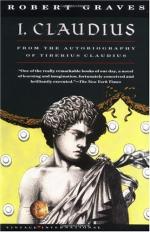|
This section contains 323 words (approx. 1 page at 400 words per page) |

|
I, Claudius Summary & Study Guide Description
I, Claudius Summary & Study Guide includes comprehensive information and analysis to help you understand the book. This study guide contains the following sections:
This detailed literature summary also contains Bibliography and a Free Quiz on I, Claudius by Robert Graves.
The initial reason Robert Graves set out to write I, Claudius (1934) was for money. Living on the Spanish island of Mallorca with the poet Laura Riding, Graves fell into some financial difficulties, which he hoped to resolve through the writing of the historical epic. The book, the first of two fictionalized accounts of Claudius, the Roman emperor from 41 to 54 a.d. , was a great success. Within a couple months it had gone into four printings both in the United States and in Great Britain. In 1937, one of Hollywood's biggest directors, Josef von Sternberg, made a failed attempt at filming Graves's epic, a failure that only enhanced the book's growing prestige.
Told from the point of view of the stuttering, physically deformed Tiberius Claudius Drusus Nero Germanicus (most commonly referred to as "Claudius,"), I, Claudius covers the reigns of Augustus, Tiberius and Caligula, and ends at the point of Claudius himself reluctantly assuming the position of emperor shortly following Caligula's assassination.
Laden heavily with political intrigue, sexual depravity, incest, conspiracies, family strife, war and pagan rituals, I, Claudius was seen by contemporary readers as an allegory of the current times and was awarded both the James Tait Black and the Hawthornden Prizes in 1935.
While the book takes poetic and historical license in several key areas, it has been widely hailed as a masterful portrayal of the Roman Empire and the families that ruled it. In Graves's version of events, Claudius was seen by most around him as a bumbling, deformed, and mentally handicapped, but generally harmless, individual who, because of those traits, was able to survive the capriciousness of Tiberius and the madness of Caligula. While those around him plotted endlessly for political power and revenge, Claudius kept to himself, quietly recording his history of Rome and of the Etruscans, but all the while keeping a keen eye on the Empire's goings- onobservations of which formed the basis of Graves's novel.
Read more from the Study Guide
|
This section contains 323 words (approx. 1 page at 400 words per page) |

|



